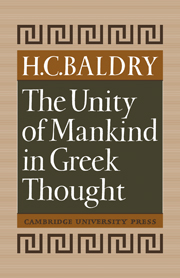Crossref Citations
This Book has been
cited by the following publications. This list is generated based on data provided by Crossref.
1968.
Conclusion.
New Surveys in the Classics,
Vol. 2,
Issue. ,
p.
40.
Jocelyn, H.D.
1973.
Homo sum: humani nil a me alienum puto(Terence,Heauton timorumenos77).
Antichthon,
Vol. 7,
Issue. ,
p.
14.
Konstan, David
1976.
Plautus' Captivi and the Ideology of the Ancient City-State.
Ramus,
Vol. 5,
Issue. 2,
p.
76.
1980.
Kosmologische Aspekte im Geschichtswerk des Poseidonios.
p.
108.
Moles, John
1983.
‘Honestius quam ambitiosius’? An exploration of the Cynic's attitude to moral corruption in his fellow men.
The Journal of Hellenic Studies,
Vol. 103,
Issue. ,
p.
103.
Epp, Ronald H.
1985.
STOICISM BIBLIOGRAPHY.
The Southern Journal of Philosophy,
Vol. 23,
Issue. S1,
p.
125.
Springborg, Patricia
1986.
Politics, Primordialism, and Orientalism: Marx, Aristotle, and the Myth of The Gemeinschaft.
American Political Science Review,
Vol. 80,
Issue. 1,
p.
185.
Cambiano, Giuseppe
1987.
Aristotle and the anonymous opponents of slavery.
Slavery & Abolition,
Vol. 8,
Issue. 1,
p.
22.
Nagler, Michael N.
1992.
Discourse and Conflict in Hesiod: Eris and the Erides.
Ramus,
Vol. 21,
Issue. 1,
p.
79.
Lucas, Rodney H.
and
Barrett, Robert J.
1995.
Interpreting culture and psychopathology: Primitivist themes in cross-cultural debate.
Culture, Medicine and Psychiatry,
Vol. 19,
Issue. 3,
p.
287.
1995.
Mind, Body and Speech in Homer and Pindar.
p.
355.
Jahoda, Gustav
1995.
The Ancestry of a Model.
Culture & Psychology,
Vol. 1,
Issue. 1,
p.
11.
Morris-Suzuki, Tessa
1995.
The Invention and Reinvention of “Japanese Culture”.
The Journal of Asian Studies,
Vol. 54,
Issue. 3,
p.
759.
Downing, F. Gerald
1996.
A Cynic Preparation for Paul's Gospel for Jew and Greek, Slave and Free, Male and Female.
New Testament Studies,
Vol. 42,
Issue. 3,
p.
454.
Delanty, Gerard
1996.
The frontier and identities of exclusion in European history.
History of European Ideas,
Vol. 22,
Issue. 2,
p.
93.
Heater, Derek
1996.
World Citizenship and Government.
p.
1.
Momigliano, Arnaldo
1998.
Ausgewählte Schriften zur Geschichte und Geschichtsschreibung.
p.
111.
Algra, Keimpe
Barnes, Jonathan
Mansfeld, Jaap
and
Schofield, Malcolm
1999.
The Cambridge History of Hellenistic Philosophy.
Heath, John
1999.
Disentangling the beast: humans and other animals in Aeschylus'Oresteia.
The Journal of Hellenic Studies,
Vol. 119,
Issue. ,
p.
17.
Schofield, Malcolm
1999.
The Cambridge History of Hellenistic Philosophy.
p.
739.





